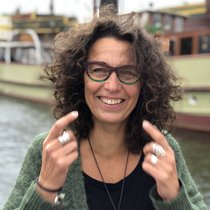The goal of the energy mobility hub is to investigate solutions for charging private and shared bikes in the public space and investigate alternatives on how to reduce energy grid congestion derived from the electrification of mobility.
The increased adoption of personal electric bikes, the unfold of new shared mobility services in cities and the current trends of mobility electrification in cities has led to new challenges in cities. Users of electric bikes often need to improvise ways to charge their bikes on the street or in their apartments in higher floors. New shared mobility services are looking for new strategies to reduce the operational cost and planning of charging. At the same time, cities are looking for new strategies to motivate users to return mobility solutions in allocated spaces and reduce the barriers people with limited mobility face in the public space. Moreover, the electrification of mobility is currently adding more pressure on the energy grid.
The Buurthub 2.0 aims to investigate potential scalable solutions for those challenges by creating and energy mobility hub for private and shared cargo electric bikes (Cargoroo). The experiment also integrates novel urban solutions for wireless charging (Tiler) using, when possible, the energy produced by second-hand solar panels (Zuiderlicht).
A holistic urban mobility approach
The Buurthub 2.0 represents a holistic approach to various aspects of urban mobility. This includes the development of energy charging stations, designed to reduce dependence on external power sources, promoting sustainability and energy efficiency and using the energy produced by solar panels on the Buurthubs roof. The initiative also delves into identity-based check-in and check-out models, enhancing efficiency and security in mobility solutions.
One of the primary goals is to simplify shared mobility, reducing the complexities of charging and maintenance through innovative tools like personnel battery prediction, resulting in efficiency and cost-effectiveness.
TILER-tile
Here's what Buurthub 2.0 is all about:
- (Almost) Energy self-sufficient stations: starting from e-bikes to investigate if this model can be translated to other electric mobility stations
- Check-in, check-out models for electric bikes: In public parings
- Workload and costs of charging for shared mobility providers (e.g. personal battery prediction)
- Opportunities for private charging in the public space
- Applications for former parking spots related to mobility charging. Investigate if forming parking spots can be used for electric bike charging
- Last mile logistics transport of goods at the future car-free Marineterrein using cargo-bikes
- New business models for startups working on the electric mobility solutions
- Ownership of the chargers and energy supply
- Identifying current scalability challenges to inform policymakers
- User behavior and willingness to adopt electric mobility hubs
- Deploying, testing and validating the different solutions that are part of the Buurthubtogether with key stakeholders
Buurthub 2.0 is all about making city life better and easier. To validate the Buurthub, a set of co-creation and testing activities will be conducted. In addition, the Buurthub it will act like a learning platform for students. Are you curious to check out the Buurthub? Swing by and test it yourself at Marineterrein, Amsterdam.
Project members

Juanita Devis Clavijo
AMS Institute
Bianca Bosman
AMS Institute
Tom Kuipers
AMS Institute
Guy Vincent
Partners





